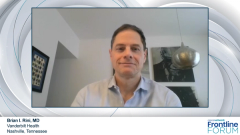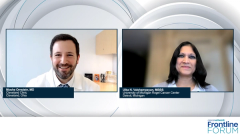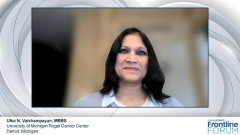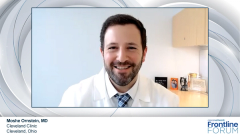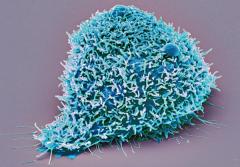
Unmet Needs in the Management of Advanced Renal Cell Carcinoma
Shared insight from Ulka N. Vaishampayan, MBBS, and Moshe Ornstein, MD, on unmet needs in the setting of clear cell and non–clear cell renal cell carcinoma.
Episodes in this series

Transcript:
Moshe Ornstein, MD: We’ve spent a good amount of time talking about these combinations. We should mention that we’re talking specifically about data in the clear cell RCC [renal cell carcinoma] setting. What do you see in terms of updates and unmet needs in patients with advanced non–clear cell carcinoma?
Ulka N. Vaishampayan, MBBS: Non–clear cell has been tougher to do trials in. Typically we’ve translated the same agents used in clear cell into the non–clear cell arena. Because they were FDA approved for kidney cancer in general, we’ve been able to gain access to them. The SWOG 1500 study, reported earlier this year, compared sunitinib with cabozantinib. It was originally a 4-arm study, but the pure MET inhibitors didn’t show adequate response to move forward. It ended up being a study that compared cabozantinib with sunitinib, and cabozantinib showed improved PFS [progression-free survival]. That’s the new standard in metastatic papillary kidney cancer. All the others—the chromophobe, medullary carcinomas, etc—remained untouched in terms of therapeutic agents. We need dedicated studies, and finding targets in those malignancies might be a start toward developing treatments for it.
The other unmet need is the subgroups of kidney cancer that aren’t doing as well as expected. For instance, patients who present with synchronous primary tumor and metastases have half the median survival: 26 months, compared with 48 months with ipilimumab-nivolumab, for instance. Even with contemporary immune checkpoint therapy, those patients aren’t doing as well as patients who’ve had nephrectomy and then relapsed a few years later with metastases. In that patient population, there are nephrectomy trials that have been conducted in the past. About 2 decades ago, the SWOG study showed benefit for upfront nephrectomy. Now the pendulum has swung to say systemic therapy is the mainstay of treatment, and cytoreductive nephrectomy may not add anything that was reported in the CARMENA trial. Our current SWOG trial, 1931, or the PROBE trial, is trying to compare a systemic immune-based checkpoint regimen combination therapy plus minus cytoreductive nephrectomy. Support that study and help us answer this question.
Moshe Ornstein, MD: It’s important to understand that the pendulum has swung. We don’t know what to do for these patients, so we take it 1 patient at a time.
Ulka N. Vaishampayan, MBBS: Absolutely.
Moshe Ornstein, MD: It’s great to have these studies, especially the PROBE study that you’re leading, that can help answer this question in terms of the timing of cytoreductive nephrectomy for patients who present with a localized mass but also with extensive metastatic disease.
Transcript edited for clarity.
Newsletter
Stay up to date on recent advances in the multidisciplinary approach to cancer.


